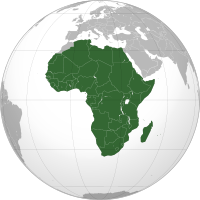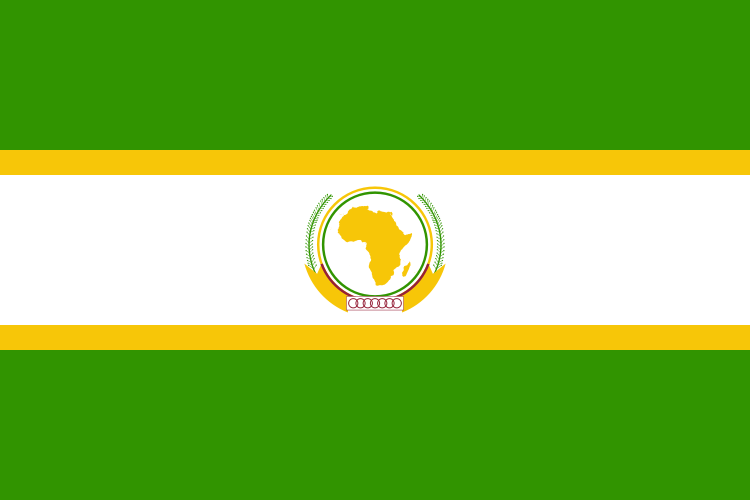African Union
 |  |
| Name: African Union | |
| Acronym: AU | |
| Year of foundation: 1963 (OAU); 2002 (AU) | |
| Headquarters: Addis Ababa, Ethiopia | |
| AU documents: go to page | |
| Official website: go to page | |
FOCUS ON | |
Description
Member states
AU has 53 members states, namely:
|
|
|
Former members
![]() Morocco (1984)
Morocco (1984)
Suspended members
![]() Guinea (2008)
Guinea (2008)
![]() Madagascar (2009)
Madagascar (2009)
![]() Eritrea (2009)
Eritrea (2009)
Côte d'Ivoire (2010)
![]() Niger (2010)
Niger (2010)
History
From the OAU to the AU
As an organization, the OAU registered achievements in assisting liberation movements in Africa to gain self rule for their various countries. However, the OAU was a victim of the Cold War that helped in undermining the cohesion that would have been needed in the continent. Many African leaders were used by respective global powers for specific strategic reasons. These rulers were supported by the West or Russia for their geo-strategic relevance rather than for their appeal to democratic precepts. With the end of the Cold War, the reigning wave of deregulation and the rise of the middle class in many African countries, populations started making more demands from their leaders in terms of accountability and transparency. Adopting the Sirte Declaration (1999), African leaders called for the creation of a new organization with the aim to promote more democracy and good governance at continental level.
While the fundamental principle under the OAU Charter was the celebration of sovereignty and non interference in the internal affairs of Member States, the Constitutive Act of the African Union is built on the condemnation and rejection of unconstitutional changes in government. The AU Charter underlines the importance to foster the culture of good governance, democracy, rule of law and popular participation.
AU structure and decision-making procedures
The Assembly of Heads of State and Government
The Assembly is the supreme organ of the Union. It meets at least once a year and has the function to determine the common policies of the Union. The Assembly has the powers to appoint judges of the AU, the president of the Commmssion (Authority) and to adopt the budget. It also monitors the implementation of policies and decisions of the Union, ensuring compliance by all Member States.
The Executive Council
The Executive Council is composed of the Ministers of Foreign Affairs or such other Ministers or Authorities as are designated by the Governments of Member States. It meets at least twice a year in ordinary session. The main task of the Council is to lead all the aspects of functional integration in the areas of trade, energy, science and technology amongst others.
Specialized Technical Committees
The specialized technical committees are composed of either ministers or senior officials and are charged with preparing programs for the Council. They also ensure follow up of the implementation of the projects and programs of the Union. The Committees equally coordinate AU programs and present recommendations to the Executive Council. There are seven technical committees that focus on a) rural and agricultural economy; b) financial and monetary issues; c) trade, customs and immigration issues; d) industry, science and technology, energy, natural resources and the environment; e) transport, communications and tourism; f) health labour and social affairs and g) education culture and human resources.
The Permanent Representatives' Committee
The Committee of Permanent representatives is composed of ambassadors of the Member states that are based in Addis Abba. The committee lays the ground work for the meetings of the Executive Council and also takes instructions from this organ. It may set up such sub-committees or working groups as it may deem necessary.
The Pan African Parliament (PAP)
The Pan African Parliament (PAP) is a novel institution, that was created in 2004 specifically to reflect the concerns of the African population in the continental administrative architecture. Composed of representatives of the national assemblies, the PAP is based in South Africa and has a consultative and advisory role. It has ten parliamentary committees and also has its own rules of procedure.
The Court of Justice
Composed of judges appointed by the Assembly of Heads of State and Government, the Court of Justice is a merger of the African Court of Justice and the African Court of Human Rights. The creation of such a strong judicial arm is considered an important tool to tamper the very strong leverage hitherto wielded by the political organs of the continental organization when it was still the OAU. However the court can only function appositely if the political masters allow it the appropriate mandate and latitude for action. The Court will work closely with the African Commission on International Law. The members of this Commission are also appointed by the Heads of State and Government.
The Authority or the Commission
The Authority or the Commission is the main organ of the Union that is most visible to the outside world. Composed of nine commissioners and a legal counsel, the Commission is led by a President and his or her deputy. Each commissioner leads a directorate, namely, the directorate of conferences and events; peace and security; political affairs; infrastructure and energy; social affairs; human resources, science and technology; trade and industry; rural economy and agriculture; and economic affairs. The Commission President and Commissioners are all appointed by the Assembly of the Heads of State and Government. The Commission is regarded as the engine of the AU and plays a crucial role in the implementation of the AU’s democracy and good governance agenda. In recognizing the importance of transparent elections, the AU Commission has created the African Trust Fund for Electoral observation and Assistance.
The Peace and Security Council (PSC)
The Peace and Security Council, instituted in 2004, has 15 members that are elected on regional lines and on the basis of geographic representativeness. The PSC plays a critical role in upholding democracy in the sense that its early warning mechanism can easily signal instances, where derogations from democratic precepts and practices may herald instability in various countries. This aspect of the role of the PSC is embodied in the AU Charter on Democracy. When there is an unconstitutional takeover in a member state, the PSC has the power to suspend the said State Party from the exercise of its right to participate in the activities of the Union. The suspension shall take effect immediately.
The Economic, Social and Cultural Council (ECOSOCC)
The Economic, Social and Cultural Council is an advisory organ composed of representatives of 150 organizations from African states and regions with the aim to guarantee the economic, social and cultural interests of civil society.
Other bodies
The New Partnership for Africa’s development (NEPAD)
The New Partnership for Africa’s development (NEPAD) was launched on 23 October 2001 as a special program to mark the level of democracy of the Union. It was widely welcomed as Africa’s Marshall Plan. Its key dimensions are African ownership, responsibility, democracy and development/people-centred leadership.
The African Peer Review Mechanism (APRM)
The APRM was created as a tool of NEPAD in 2003, after the adoption of the Durban Declaration on Democracy, Political, Economic and Corporate Governance. It was envisaged to be the device with which to ensure better governance through a means of mutual assessment or reciprocal peer review. The APRM is based, amongst others, on an APRM Trust Fund.
Financial Bodies
There are plans to create an African Central Bank that is to be based in Nigeria. It will manage a single currency or Afro for the entire continent, regulating the banking sector and determining the official exchange and interest rates. The second financial institution is the African Investment Bank that is to be based in Tripoli (Libya). It would have to guarantee the local governments coordination for the funding of planned projects. Finally the African Monetary Fund will be based in Yaoundé (Cameroon). In time the operations of the Fund will be transferred to the Central Bank.
Decision-making within AU
The highest policy-making institutions within AU, i.e. the Assembly of Heads of State and Government and the Executive Council, in general adopt decisions by unanimity. If such consensus is not attained then a two thirds majority is used as threshold. However on matters that are procedural the cut off is a simple majority.
